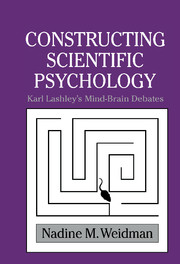Book contents
- Frontmatter
- Contents
- Preface
- Acknowledgments
- List of abbreviations
- Introduction
- 1 Lashley and Jennings: The origins of a hereditarian
- 2 Lashley, Watson, and the meaning of behaviorism
- 3 The pursuit of a neutral science
- 4 Neuropsychology and hereditarianism
- 5 Psychobiology and Progressivism
- 6 Psychobiology and its discontents: The Lashley-Herrick debate
- 7 Hull and psychology as a social science
- 8 Intelligence testing and thinking machines: The Lashley-Hull debate
- 9 Pure psychology
- 10 Public science and private life
- 11 Genetics, race biology, and depoliticization
- Epilogue: Lashley and American neuropsychology
- Appendix: Archives holding Lashley material
- Bibliography
- Index
Epilogue: Lashley and American neuropsychology
Published online by Cambridge University Press: 16 September 2009
- Frontmatter
- Contents
- Preface
- Acknowledgments
- List of abbreviations
- Introduction
- 1 Lashley and Jennings: The origins of a hereditarian
- 2 Lashley, Watson, and the meaning of behaviorism
- 3 The pursuit of a neutral science
- 4 Neuropsychology and hereditarianism
- 5 Psychobiology and Progressivism
- 6 Psychobiology and its discontents: The Lashley-Herrick debate
- 7 Hull and psychology as a social science
- 8 Intelligence testing and thinking machines: The Lashley-Hull debate
- 9 Pure psychology
- 10 Public science and private life
- 11 Genetics, race biology, and depoliticization
- Epilogue: Lashley and American neuropsychology
- Appendix: Archives holding Lashley material
- Bibliography
- Index
Summary
… [B]less you for saying to me what you do about his “accomplishing nothing,” and putting it in the right perspective. It did bother him that, after exploding his own latest theory, expressed in the Princeton lectures, he had no alternative to offer. But I think he still felt he had pointed a way, and it was up to the next generation now.
Claire Schiller LashleyIn my interpretation, Karl Lashley's life and work illustrate three basic themes that I want now to review and to tie together. The first is the idea that during the period from 1910 to 1955, the mind-body problem – the puzzle of the relationship between consciousness and matter – became inseparably involved with the nature-nurture dispute: which was the greater determinant of intelligence and ability, heredity or environment? It is difficult to find a life scientist from the first half of this century who did not express an opinion on the nature-nurture question, especially as genetics developed in scientific and social significance, and the question took on increasing urgency. As a result, understanding psychologists' and biologists' answers to the problem of mind, brain, and behavior is impossible unless those answers are seen in the light of the nature-nurture debate.
- Type
- Chapter
- Information
- Constructing Scientific PsychologyKarl Lashley's Mind-Brain Debates, pp. 187 - 192Publisher: Cambridge University PressPrint publication year: 1999



